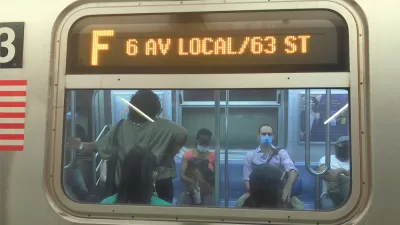As the U.S. House of representatives approved the passive stimulus package approved by the U.S. Senate earlier in the week, more details emerged about the parts of the bill that will be relevant to planners during the coming weeks and months.
Planetizen coverage of the federal stimulus package focused on initial reports about funding for public transit and housing relief shortly included in the package approved by the Senate on March 25.
With the House of Representatives approving the package on Friday, more details are available about the portions of the package that will be relevant to the efforts of planners to provide relief during the economic and public health crises of the coronavirus pandemic.
On March 26, the Planners' Advocacy Network of the American Planning Association (APA Advocates) hosted a virtual discussion to react to the stimulus bill, which you watch above. On March 27, APA Advocates posted a Twitter thread with specific information about the provisions included in the stimulus package.
The U.S. House of Representatives is preparing to vote on the CARES Act, which will provide communities with immediate #Coronavirus relief. Here's everything planners need to know. #CARESact
thread below (1/16)— APAadvocates (@APAadvocates) March 27, 2020
On March 25, the International Economic Development posted a pdf that lists the specific provisions in the bill designed to support the economy and ease the burden of the pandemic for families and workers.
For a higher level perspective on the bill, see also analysis by Kelsey Snell, for NPR, which breaks down the bill's spending by group: 1) 560 billion for individuals, $500 billion for big corporations, $377 billion for small businesses, $339.8 billion for state and local governments, $153.5 billion for public health, $43.7 billion for education/other, and $26 billion for the safety net.
The approved bill will be known as the CARES Act, short for the the Coronavirus Aid, Relief, and Economic Security Act.
FULL STORY: What's Inside The Senate's $2 Trillion Coronavirus Aid Package

Planetizen Federal Action Tracker
A weekly monitor of how Trump’s orders and actions are impacting planners and planning in America.

Maui's Vacation Rental Debate Turns Ugly
Verbal attacks, misinformation campaigns and fistfights plague a high-stakes debate to convert thousands of vacation rentals into long-term housing.

San Francisco Suspends Traffic Calming Amidst Record Deaths
Citing “a challenging fiscal landscape,” the city will cease the program on the heels of 42 traffic deaths, including 24 pedestrians.

Amtrak Rolls Out New Orleans to Alabama “Mardi Gras” Train
The new service will operate morning and evening departures between Mobile and New Orleans.

The Subversive Car-Free Guide to Trump's Great American Road Trip
Car-free ways to access Chicagoland’s best tourist attractions.

San Antonio and Austin are Fusing Into one Massive Megaregion
The region spanning the two central Texas cities is growing fast, posing challenges for local infrastructure and water supplies.
Urban Design for Planners 1: Software Tools
This six-course series explores essential urban design concepts using open source software and equips planners with the tools they need to participate fully in the urban design process.
Planning for Universal Design
Learn the tools for implementing Universal Design in planning regulations.
Heyer Gruel & Associates PA
JM Goldson LLC
Custer County Colorado
City of Camden Redevelopment Agency
City of Astoria
Transportation Research & Education Center (TREC) at Portland State University
Jefferson Parish Government
Camden Redevelopment Agency
City of Claremont





























